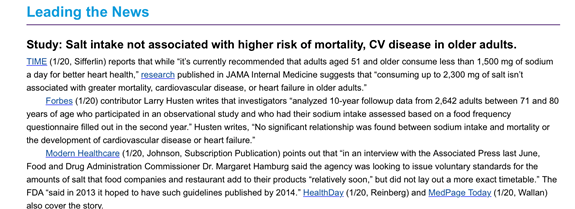
Ahmed Alquthami
1. Computers using digital footprints are better judges of personality than friends and family
Researchers have found that, based on enough Facebook Likes, computers can judge your personality traits better than your friends, family and even your partner. Using a new algorithm, researchers have calculated the average number of Likes artificial intelligence (AI) needs to draw personality inferences about you as accurately as your partner or parents.
http://www.sciencedaily.com/releases/2015/01/150112154456.htm?utm_source=feedburner&utm_medium=email&utm_campaign=Feed%3A+sciencedaily%2Ftop_news%2Ftop_health+%28ScienceDaily%3A+Top+Health+News%29
2. Genetic discovery about childhood blindness paves way for new treatments
Finding genes for retinal degenerations has immediate benefits for people living with blindness and vision loss, their families, and their physicians. Establishing a genetic cause confirms the clinical diagnosis at the molecular level, helps predict the future visual prognosis, suggests therapies, and allows some patients to join clinical trials. While more than 200 genes for retinal degenerations have been identified, approximately 40-50 percent of cases remain a mystery.
http://www.sciencedaily.com/releases/2015/01/150112181342.htm?utm_source=feedburner&utm_medium=email&utm_campaign=Feed%3A+sciencedaily%2Ftop_news%2Ftop_health+%28ScienceDaily%3A+Top+Health+News%29
3. Diabetes prevention should focus on lifestyle factors
The article, “Prevention of Type II diabetes mellitus in Qatar: Who is at risk?” presents the results of a case-control study conducted at Hamad Medical Corporation Hospital (HMC) to identify the key risk factors for Type II diabetes among Qatar’s total population. The study was led by a team of researchers at Weill Cornell Medical College in both of its branches in New York and Qatar, as well as physicians at HMC. The work was supported by Qatar Foundation, the Weill Cornell Clinical and Translational Science Centre, and the Biostatistics, Epidemiology and Biomathematics Research Core of Weill Cornell Medical College in Qatar.
http://www.gulf-times.com/qatar/178/details/423071/diabetes-prevention-should-focus-on-lifestyle-factors
http://kaiserhealthnews.org/news/as-caregiving-shifts-to-the-home-scrutiny-is-lacking/?utm_campaign=KHN%3A+Daily+Health+Policy+Report&utm_source=hs_email&utm_medium=email&utm_content=15455550&_hsenc=p2ANqtz--9tG1mwr_MLrLg9i3bxn1WrY9KqDmWHdW-BtqP1ncKc1OS03HO0cPlKmDdD5hO7wBrCRGfNKeqb7AlRIPzFkJW9miq7A&_hsmi=15455550
California’s publicly funded in-home care program leaves elderly and disabled clients vulnerable to abuse and poor treatment, Kaiser Health News investigation finds.
http://www.sciencedaily.com/releases/2015/01/150108083701.htm?utm_source=feedburner&utm_medium=email&utm_campaign=Feed%3A+sciencedaily%2Ftop_news%2Ftop_health+%28ScienceDaily%3A+Top+Health+News%29
Looking at whether a man’s uncles and great-grandparents, among other second- and third-degree relatives, had prostate cancer could be as important as looking at whether his father had prostate cancer. A more complete family history would give physicians a new tool to decide whether or not a PSA test was appropriate, experts say.
"tactic worthy of used car salesmen."
One urologist is challenging women to get the men in their lives to test their PSA and testosterone levels.
http://www.sciencedaily.com/releases/2015/01/150108083704.htm?utm_source=feedburner&utm_medium=email&utm_campaign=Feed%3A+sciencedaily%2Ftop_news%2Ftop_health+%28ScienceDaily%3A+Top+Health+News%29
HPV testing alone is an effective alternative to current cervical cancer screening methods that use a Pap smear, or Pap smear-plus HPV test, according to new new interim guidance written by a group of cervical cancer screening experts.
Jamie Chen
http://www.medpagetoday.com/PrimaryCare/ExerciseFitness/49613?xid=nl_mpt_DHE_2015-01-20&utm_content=&utm_medium=email&utm_campaign=DailyHeadlines&utm_source=ST&eun=g332005d0r&userid=332005&email=rokimbo1%40verizon.net&mu_id=5325973&utm_term=DailyUnhealthiness of Sitting Not Offset by Exercise: Meta-Analysis
Greater sedentary time was associated with increased risk of adverse health outcomes including early death, even in those who otherwise exercised regularly, a meta-analysis indicated.
http://www.washingtonpost.com/news/to-your-health/wp/2015/01/22/many-women-who-might-become-pregnant-are-getting-prescription-painkillers-that-can-cause-birth-defects/ On Painkillers and Thinking about Getting Pregnant? Better Talk to Your Doctor. Genetic architecture of artemisinin-resistant Plasmodium falciparum. Nature Genetics, 2015; DOI: 10.1038/ng.3189 More than one-fourth of women who might become pregnant are getting prescriptions for opiod painkillers, such as Vicodin and Oxycontin, that can cause birth defects and other serious problems early in pregnancy, according to a report released Thursday by the Centers for Disease Control and Prevention.
http://www.washingtonpost.com/national/health-science/scientists-claim-breakthrough-in-taming-genetically-modified-ecoli-bacteria/2015/01/21/40fec984-a0c3-11e4-903f-9f2faf7cd9fe_story.html
Scientists Claim Breakthrough in Taming Genetically Modified E.coli Bacteria
Scientists have come up with a way to make genetically modified bacteria incapable of running wild in the natural world, according to two reports published Wednesday in the journal Nature. The secret is to make these microbes dependent on artificial food — synthetic amino acids that don’t occur in nature. In the wild, they’d starve and die.
Lauren Groskaufmanis
Researcher hoping to test heroin vaccine in humans.
http://time.com/3654784/why-youve-never-heard-of-the-vaccine-for-heroin-addiction/
TIME (1/10, Sifferlin) reported on Scripps Research Institute chemist Kim Janda’s research into heroin vaccination, noting there are no current human trials despite the promise of his work. Preclinical trials in 2013 for the vaccine “on heroin-addicted rats showed those vaccinated didn’t relapse into addiction and were not hooked by high amounts of heroin in their system.” Dr. George Koob, director of the National Institute on Alcohol Abuse and Alcoholism (NIAAA), said, “It’s really dramatic. You can inject a rat with 10 times the dose of heroin that a normal rat [could handle] and they just look at you like nothing happened. It’s extraordinary.” Time added that Janda and Koob “are hoping to get investigational new-drug (IND) distinction from the FDA so that they can test the vaccine in humans.”
'Generic' Colchicine to Hit Market -May provide some price relief for gout patients.
A so-called authorized generic version of the colchicine formulation sold as Colcrys for acute gout flares and for treating familial Mediterranean fever will be "widely available" starting later this week, according to Colcrys's manufacturer.
http://www.medpagetoday.com/Rheumatology/GeneralRheumatology/49493?xid=nl_mpt_DHE_2015-01-13&utm_content=&utm_medium=email&utm_campaign=DailyHeadlines&utm_source=ST&eun=g332005d0r&userid=332005&email=rokimbo1%40verizon.net&mu_id=5325973&utm_term=Daily
http://www.slate.com/articles/health_and_science/medical_examiner/2011/03/a_giant_pain_in_the_wallet.html
BPA and BPS (substitute for BPA) affect embryonic brain development in zebrafish: Low levels of chemicals linked to hyperactivity
Posted: 12 Jan 2015 12:46 PM PST
Bisphenol A, known as BPA, is produced in massive quantities around the world for use in consumer products, including household plastics. In response to public concerns, many manufacturers have replaced BPA with a chemical called bisphenol S (BPS), which is often labeled as "BPA-free" and presumed to be safer by consumers. Scientists have provided evidence that both BPA and BPS cause alterations in brain development leading to hyperactivity in zebrafish.
http://www.sciencedaily.com/releases/2015/01/150112154606.htm
Alex Liles
http://www.sciencedaily.com/releases/2015/01/150107204818.htm?utm_source=feedburner&utm_medium=email&utm_campaign=Feed%3A+sciencedaily%2Ftop_news%2Ftop_science+%28ScienceDaily%3A+Top+Science+News%29 Individuals on a moderate-fat diet who ate an avocado every day had lower bad cholesterol than those on a similar diet without an avocado a day or on a lower-fat diet, researchers report .
http://www.sciencedaily.com/releases/2015/01/150108113525.htm?utm_source=feedburner&utm_medium=email&utm_campaign=Feed%3A+sciencedaily%2Ftop_news%2Ftop_health+%28ScienceDaily%3A+Top+Health+News%29 Just one cup of blueberries per day could be the key to reducing blood pressure and arterial stiffness, both of which are associated with cardiovascular disease.
http://www.sciencedaily.com/releases/2015/01/150105125916.htm?utm_source=feedburner&utm_medium=email&utm_campaign=Feed%3A+sciencedaily%2Ftop_news%2Ftop_health+%28ScienceDaily%3A+Top+Health+News%29 A new way to selectively insert compounds into cancer cells has been developed by scientists -- a system that will help surgeons identify malignant tissues and then, in combination with phototherapy, kill any remaining cancer cells after a tumor is removed. Ultimately, it could make cancer surgery far more effective.
Mackenzie Lind
Colorectal cancers in black patients have molecular differences
There are higher rates of colorectal cancer and higher mortality from the disease in black individuals, which indicates a need for more research into racial differences in colon cancer. A recent study sequenced colon cancers samples of both blacks and whites and found that there are specific genes that contribute to colorectal cancer in blacks only.
http://www.cleveland.com/healthfit/index.ssf/2015/01/colorectal_cancers_in_black_patients_have_molecular_differences_latest_discovery_from_gi-spore_program_in_cleveland.html
Genome sequencing’s value challenged in Stanford study
In a twin study of the immune system, researchers found that 60% of immune markers were influenced by non-genetic factors, and that this increased with age. In an era where genome sequencing has become very popular, this study is said to provide evidence against it.
http://www.sfgate.com/health/article/Scientists-say-environment-trumps-genetics-in-6018629.php
Black women working night shifts have an increased risk of developing diabetes
In results from a large ongoing study of African American women, a recent paper shows that women who have worked the night shift (vs those who have not) are at a higher risk of developing diabetes, and that this risk is higher in younger women. The associations remained even after taking into account lifestyle factors such as BMI.
http://www.sciencedaily.com/releases/2015/01/150111195429.htm?utm_source=feedburner&utm_medium=email&utm_campaign=Feed%3A+sciencedaily%2Ftop_news%2Ftop_health+%28ScienceDaily%3A+Top+Health+News%29
Carrie Miller
Head Start Really Does Help Obese Kids
Head Start preschool programs had a positive effect on the body mass index (BMI) for obese and overweight children over the course of an academic year. Both obese and overweight children who participated in Head Start saw a greater decline in BMI z score during their first academic year (P<0.001) than their counterparts in comparison groups, according to a new study to be published in the February issue of Pediatrics.
More Drugs, Better Survival in Metastatic Colon Cancer
Twice as many patients with metastatic colorectal cancer remained alive after 5 years with a four-drug chemotherapy regimen plus bevacizumab (Avastin) versus three drugs and the angiogenesis inhibitor, investigators reported here.
Weighing In on New Obesity Treatment
It has been around for a few years, but got a slow start toward clinical use when the EMPOWER study could not demonstrate a significant weight loss between subjects for whom the device was turned on and subjects for whom the device remained off. The aptly named ReCharge study was subsequently able to find a 9.2% difference in weight loss between subjects with an active device and subjects with a sham device over the first 12 months. All subjects received moderate lifestyle intervention in diet and exercise.
Jaime Moore

2. https://vcuhsra.mcvh-vcu.edu/f5-w-687474703a2f2f74696d652e636f6d$$/3675152/this-drink-could-protect-you-from-skin-cancer/ (one of links)
3. https://vcuhsra.mcvh-vcu.edu/f5-w-687474703a2f2f74696d652e636f6d$$/3673567/sodium-older-adults/ (one of the links)

Nhung Nguyen
Rare shared genetic mutation for disease in Inuit discovered
Posted: 19 Jan 2015 09:47 AM PST
A team of Canadian and Japanese researchers has identified the genetic mutation responsible for glycogen storage disease type IIIa in Inuit in northern Quebec, Canada. Their paper identifies a mutation in the gene encoding the glycogen debranching enzyme, which had previously been undetected in a decade of investigation by the same authors.
Why do only some people with hereditary heart disease experience symptoms?
Posted: 04 Jan 2015 12:24 PM PST
In addition to gene mutations, environmental stress plays a key role in the development of the heart disease hypertrophic cardiomyopathy, researchers have found for the first time. As many as 500,000 people in the United States have a heritable and potentially fatal heart disease called hypertrophic cardiomyopathy. The disease can cause irregular heartbeats, heart valve problems, heart failure and, in rare cases, sudden cardiac death in young people. But some people who carry gene mutations that cause hypertrophic cardiomyopathy never experience symptoms.
Epigenomics analysis reveals surprising new clues to insulin resistance
Posted: 05 Jan 2015 08:25 AM PST
In studying the cellular structure and function of insulin, a research team has uncovered previously unknown steps in the development of insulin resistance. Previous investigations of insulin resistance have focused almost exclusively on proteins and cellular functions at or near the surface of cells, where insulin binds. However, epidemiological and molecular data have suggested that events leading to insulin resistance might also take place in the nucleus, where the DNA blueprint is stored.
Julie Park
The New York Times: Paying Till It Hurts
In her series on the costs of health care, Elisabeth Rosenthal of The New York Times examines the price of medical care in the United States, interviewing patients, physicians, economists, and hospital and industry officials. In each installment, readers were invited to share their perspectives on managing costs and treatment. (Rosenthal, 1/13)
The Los Angeles Times (1/20, Brown) reported that even though just “a handful of patients in Los Angeles County have drug-resistant TB,” their treatment, which “is grueling and expensive,” is considered “necessary to prevent further spread of the disease, which spreads through the air, public health officials said.” In 2013, five cases of TB in Los Angeles County were resistant to multiple drugs.
The Wall Street Journal (1/17, Silverman) “Pharmalot” blog reported that Sen. Michael Bennett (D-CO) and Sen. Orrin Hatch (R-UT) have re-introduced the Promise for Antibiotics and Therapeutics for Health Act (PATH), which would hasten the approval process for a serious or life-threatening condition that addresses an unmet medical need. Specifically, PATH would address the growing problem of antibiotic resistance.
The Boston Globe (1/19) editorialized that a potential breakthrough antibiotic “derived from microbes dwelling in plain old New England dirt” is a “rare flash of good news in an increasingly desperate struggle against pathogens that have developed resistance to most conventional antibiotics.” The paper added that according to Anthony S. Fauci, director of the National Institute of Allergy and Infectious Diseases, “We’re seeing a very steady and very concerning acceleration of antimicrobial resistance.” He added, “There’s a critical need for new knockout medicines. But the numbers of new antibiotics are steadily lagging behind the pace of emergence of drug resistance.”